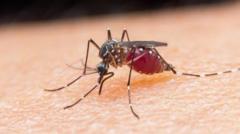Egypt's long-standing battle against malaria has culminated in a historic milestone, with the World Health Organization (WHO) officially declaring the nation malaria-free, an accomplishment that WHO chief Tedros Adhanom Ghebreyesus described as "truly historic." Malaria, a disease deeply rooted in Egyptian civilization, has plagued the region since ancient times. However, authorities have dedicated nearly a century to combatting the mosquito-borne disease, marking the end of a significant chapter in public health.
To achieve certification, countries are required to demonstrate a sustained halt in malaria transmission for at least three consecutive years. Malaria, responsible for the deaths of approximately 600,000 individuals yearly—with the majority occurring in Africa—presents a major public health challenge. Egypt's certification underscores its success as the third country in the WHO's Eastern Mediterranean Region to receive this acknowledgment, following the United Arab Emirates and Morocco.
The WHO commended both the Egyptian government and its citizens for their concerted efforts in eradicating a disease that has persisted for millennia. Despite this achievement, global health experts caution that this is merely the beginning of a new phase in the fight against malaria. As the WHO highlighted, vigilance is essential to maintaining this malaria-free status, emphasizing the necessity of continued preventative measures.
The effective reduction of malaria in Egypt began back in the 1920s, when authorities implemented strategies to minimize human-contact with mosquitoes, such as banning the cultivation of rice and other crops close to residential areas. Advances in monitoring, the implementation of vaccines, and education on prevention strategies, such as avoiding mosquito bites, are crucial in this ongoing battle.
As Egypt celebrates its historic milestone, the broader global community is reminded of the importance of sustained efforts to combat malaria, a disease that remains a significant threat around the world. The challenge now lies in ensuring that Egypt remains vigilant in its fight against this complex parasite, securing the hard-won progress made over the past century.


















